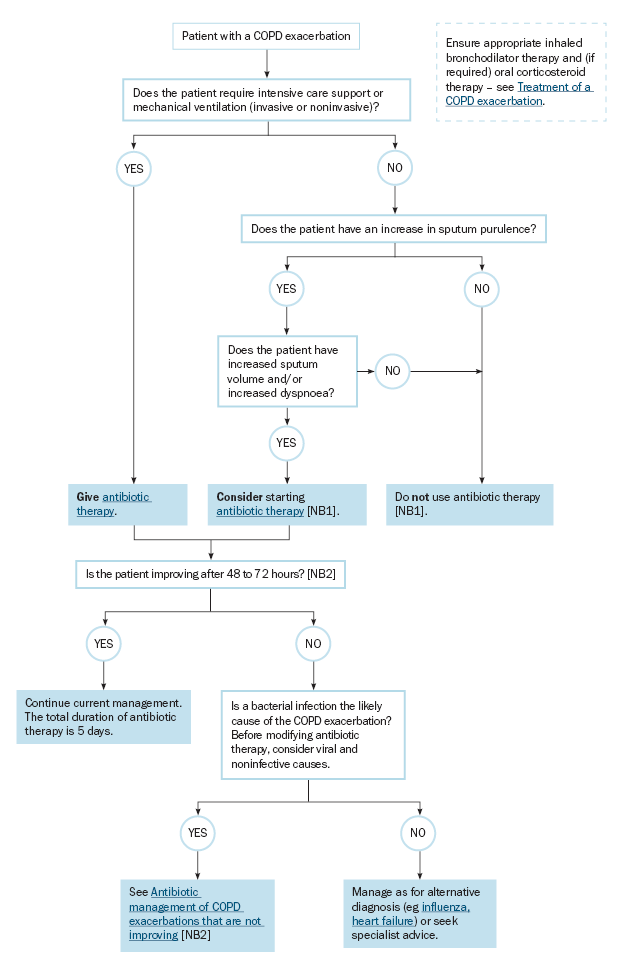The role of antibiotic therapy for COPD exacerbations
Nonantibiotic therapy (eg inhaled bronchodilators, oral corticosteroid therapy) is the mainstay of treatment for chronic obstructive pulmonary disease (COPD) exacerbations, including for patients with prolonged symptoms; see Chronic obstructive pulmonary disease (COPD) exacerbations in the Respiratory guidelines.
Antibiotic therapy is not routinely recommended for COPD exacerbations; the benefit of antibiotic therapy is related to the likelihood of bacterial infection and the severity of the exacerbationWedzicha, Miravitlles, , 2017. For advice on when to use antibiotic therapy for a COPD exacerbation, see Antibiotic management of COPD exacerbations.
Give antibiotic therapy to patients with a severe COPD exacerbation who require intensive care support or mechanical ventilation (invasive or noninvasive) to significantly reduce the rate of treatment failure and mortalityVollenweider, 2018Global Initiative for Chronic Obstructive Lung Disease (GOLD), 2025.
Consider antibiotic therapy for patients with a COPD exacerbation who do not require intensive care support or mechanical ventilation (invasive or noninvasive) if there is an increase in sputum purulence with increased sputum volume and/or increased dyspnoeaChen, 2020Stockley, 2000Miravitlles, 2012Global Initiative for Chronic Obstructive Lung Disease (GOLD), 2025Wedzicha, Miravitlles, , 2017.
Safely withhold antibiotic therapy for patients managed in the community with less severe COPD exacerbations because treatment does not consistently improve outcomesVollenweider, 2018van Velzen, 2017.
Serum C-reactive protein (CRP) testing can help to determine the presence of bacterial infection in COPD exacerbations and subsequently the potential benefit of antibiotic therapy; however, at the time of writing, evidence to support this practice is limited. A low CRP result supports the decision to withhold antibiotic therapyButler, 2019Global Initiative for Chronic Obstructive Lung Disease (GOLD), 2025Dabscheck, 2022.
The Australian Commission on Safety and Quality in Health Care (ACSQHC) provides a decision aid to support discussions regarding antibiotic therapy for COPD exacerbations and a Clinical Care Standard to support best practice in the assessment and management of COPD, including exacerbations.

COPD = chronic obstructive pulmonary disease
NB1: A decision aid to support discussions regarding antibiotic therapy for COPD exacerbations is available from the Australian Commission on Safety and Quality in Health Care (ACSQHC).
NB2: Lack of response to initial antibiotic therapy for a COPD exacerbation rarely requires switching to broader-spectrum therapy. For patients with mild COPD, symptoms of an exacerbation can last for 7 to 10 days. In patients with moderate to severe COPD, symptoms can persist for weeks.
